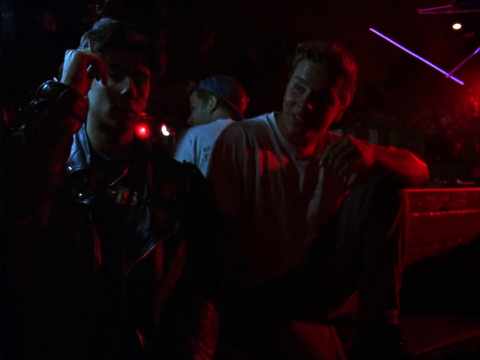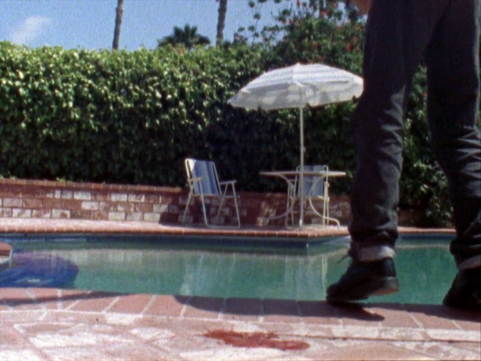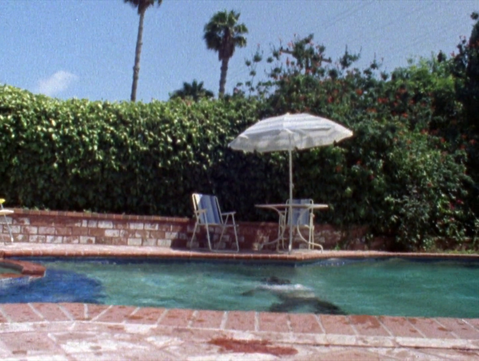Totally Fucked Up (1993)
- nickkarner
- Apr 16, 2021
- 7 min read
Updated: Sep 10, 2021

As composer/lyricist William Finn once wrote: “Everything’s changed/and nothing’s changed.” Gregg Araki was only 33 years old when he wrote and directed Totally Fucked Up (1993), his fourth feature and known by those willing to screen it as Totally F***ed Up for obvious reasons. With his finger firmly on the pulse of America’s deeply divided feelings regarding homosexuality, he’d make minor references and statements way before the internet had its way with them, like referring to Mel Gibson as a “homophone a-hole" and calling Tom Cruise “the Rock Hudson of the 90’s” in reference to his rumored sexual preferences. These were small potatoes compared to his acknowledgement of both the religious right and government’s oppressive targeting of homosexual individuals in an effort to absolutely eradicate them.

Araki has always been a truthful filmmaker. That truth may be difficult to swallow, no pun intended, but marginalized and alienated individuals deserve to have a voice as well. Representing not only the first in his “Teenage Apocalypse” trilogy; the film was also his last foray into the purest form of independent filmmaking, i.e. a non-professional cast and crew. The writer/director has never shied away from the harsh realities of what it’s like to be young, angry, and confused. So many of his films reflect a rage that can only come from offenses perpetrated by the powers that be. While Totally Fucked Up is no less honest than his subsequent work, it’s also one of his most sincere pieces of art; following the lives of six gay teens in an adult-free Los Angeles.

With the advent of affordable digital technology, Araki was able to supplement his relatively short 78-minute film by shooting half of it on 16mm color film stock and the rest in a cinema verité style with a digital camcorder. Inspired by the experimental nature of Jean-Luc Godard’s Masculin Feminin (1966), we’re informed via a rotating bevy of interstitials and title cards that not only are we about to get “more teen angst,” but this is also “another homo movie by Gregg Araki.” He’s always been front and center as the author of his movies. Prior to the frenetic onslaught of words, music, and images, a cold open featuring a photocopied news article is shown on a table accompanied by silence. The article details the double suicide of two gay fifteen-year-old boys. It’s a somber and slightly on-the-nose way to begin a film that rails against a vicious society of garbage people who treat those whom they don’t understand with contempt, but I believe that artists must do what they must to get their message across.
Gregg Araki met his frequent leading man James Duval while the would-be actor worked in a café. As the de facto star of all three films in the trilogy, it stands to reason that one would assume Duval is ostensibly playing a variation on the director himself. Although this isn’t inaccurate, James Duval brings his own sensibilities and laconic attitude to each role, beginning with the dark and moody Andy, aka Eraserhead. As he speaks directly to a flickering digital camera, he states simply: “I guess you could say I’m totally fucked up.” The young man behind the camera is Steven (Gilbert Luna), who is documenting the lives of his best friends: his boyfriend Deric, (Lance May), resident doofus Tommy (Roko Belic, Oscar-nominated documentarian - Genghis Blues), and two vivacious ladies, Michele (Susan Behshid) and Patricia (Jenee Gill), who joyfully exclaim in unison, “We both think this is completely retarded!”
Gregg Araki has a lot to say and he takes the very clever approach of a multi-media panorama by inserting both stock footage and title cards to present “15 random celluloid fragments.” “Lifestyles of the Bored and Disenfranchised” precedes a wonderfully-framed wide of our six protagonists sitting next to a sign that reads simply ‘END.’ We get the usual snarky exchanges that have become de rigeur in Araki’s work: “Why do fags have to wear so much perfume?” “So they can sniff each other out in the dark.” This dialogue could come off as mean if it weren’t being spoken by gay characters themselves and if the tone were anything other than light and breezy. Even the subject of gay kids in Europe taking their own lives is met with more of a shrug than outrage.
More prescient musings as Steven makes a “What’s In/What’s Out” piece. What’s In: Bigotry. Sexism. Jesus. Homophobia. Stupidity. Violence. Spiritual Bullshit. Making Money. What’s Out: Punk Rock, Abortion. Sex. As one of the fragments, sex is discussed and seen through various prisms. While Steven and Deric’s relationship has grown stale, Andy looks at sex as “a hassle,” while Tommy is an immature horndog who can’t get enough, including trying to touch a friend while they jerk off to a porno. Michele has a sensuous feel for sex, while Patricia rails against AIDS and the “government sponsored genocide” and “biological warfare” perpetrated by the politicians and homophobes.
Without the confessional format, the film could easily be a stream-of-consciousness-style series of loosely-connected scenes, but there is indeed a plot going on. Love is introduced, with several different takes, including: “Love lasts as long as a squirt in the dark.” “Love is all that matters.” “Love does not exist.” They even play a manufactured version of love with a silly boardgame called Heartthrob, which Michele complains about, “Heterosexuality sucks, even as a board game.”
The film does work as a bit of a checklist for Araki’s obsessions and dissection of gay life. Most of the boys donate sperm by jerking off into a condom for Michele to attempt artificial insemination. The subject of masturbation is presented as “A Public Service Announcement.” Tommy thinks he has AIDS because he feels ill; conversion therapy and stereotypical gay obsessions like Bette Midler are scoffed at; and Patricia describes the population growing and growing while getting “stupider and stupider. No wonder the whole world is going down the toilet.” The end of the world would be more implicitly referenced in The Doom Generation (1995) and Nowhere (1997), but the seeds of end times are planted here.
Araki’s shot composition is uncanny, with a wide shot outside of a laundromat framing Steven and Michele to the right of the screen as he confesses to cheating on Deric. Meanwhile, Andy meets Ian (Alan Boyce, Handjob in Nowhere) as a random dominatrix passes by, led by a slave on a leash. Ian is slightly older and has a seductive air. He also meshes well with Andy’s outlook as they survey the landscape. “L.A. is so fucking weird. Like they dropped a neutron bomb.” “Alienation capital of the world.” Ian softly kisses Andy, who responds with “Don’t touch me unless you mean it.” It’s a very sexy scene and they go out on a date that Friday to see The Kamikaze Dildos perform at the Hellhole. I can’t say for sure if I had one of their albums in my odd collection of oldies and original cast albums.
While Tommy finds Andy’s mounting affection for Ian highly amusing, Steven records a bedroom confessional, which Deric unfortunately sees later. Furious, he storms out. Later on, Tommy becomes the go-between for Steven and Deric since he left his house after his parents found some compromising reading material. When his dad confronts him, he says “Yeah, I’m a homo. So fucking what?” He gets hit for his trouble.
“Another Saturday night in the gay mecca and abso-fuckin-lutely nothing to do.” Andy’s attitude towards life tends to be one of resigned ambivalence. He even mentions to Ian: “I’m avoiding looking for a job at the moment.” Ian awakens something in Andy when he runs his tongue all over his naked body, but it turns out Ian is a real player and is juggling several bed partners.
In the film’s most terrifying moment, Deric is wandering along the sidewalk and is set upon by several men wielding blunt objects. It’s a particularly jarring scene because in many cases, the depiction of hate crimes, particularly those against homosexuals and African-Americans, usually have an ominous prelude where some redneck is saying something like, “Looky what we got here...” Here, the attack comes out of nowhere and we only see the aftermath, with a bloody Deric calling Steven from outside of an Arby’s. In a brilliant, budget-friendly move, Araki shoots the group standing in front of a hospital’s emergency sign, indicating a medical facility but never actually showing one, which probably would’ve been difficult to shoot at anyways.
The women get a bit short-shrifted as the film focuses on the young men, particularly Steven and Andy, whose lives are slowly falling apart. Steven blames himself for Deric’s attack while Andy discovers Ian’s other lovers. It appears that Andy is keeping things together, setting up an emotional wall by telling Ian, “No, that’s not OK,” and saying his “poor little heart got fuckin’ broken. BFD.” The red, white, and blues of the American flag pop up all around as Andy falls farther down the rabbit hole of depravity, allowing himself to be picked up and penetrated by a stranger. Earlier, he’d expressed his own disgust at the idea of “butt fucking.”
In a shocking and devastating sequence, he attempts to call his best friends, who are either talking on the phone to each other, or in Steven’s case, about to take a shower. The film uses a clever bait-and-switch, with Steven acting much more stressed out and appearing to be contemplating suicide as he enters the bathroom. You expect to find Steven with his wrists slit, but instead, we get the awful sight of Andy downing a deadly cocktail of liquor and drain-o, spitting up blood, and collapsing into a pool.
A grainy closeup of a handsome Andy plays and he speaks to the camera: “I wanna enjoy life while I’m young enough to appreciate it. That’s what it’s all about, right?” The film cuts to its final, extraordinary shot. The group, now only five, sit together watching the video. The camera slowly pans across their faces. No one is crying. No one speaks. Some of them don’t even look up. There’s sadness, but they appear numb. Steven gets up and turns off the video, which literally ends the film as well. The credits roll, and one particular message is striking. “A big fucking no thanks to...you all know who you are.” It’s a fascinating piece of text. To whom is it directed at? The right-wing prejudiced bigots who continue to hurt innocent people? Or could it be directed at those who harbor no ill-will toward gay people but don’t lift a finger for their cause?

Totally Fucked Up is quietly powerful. Its heart and vitality shine through despite the wandering quality of the first half. It’s a highly impressive film since Araki could easily have gone for a non-narrative approach, but he understands that film as a medium is often about storytelling. Sure, art films and plotless cinema can be absolutely breathtaking, but taking a journey with compelling characters is still a bracing and enervating experience. The film doesn’t condescend toward its youthful cast. To them, these things matter, even though they probably don’t; but to them, they do. As the director would grow in ambition and his films would get bigger and more polished, this may be his most uplifting, yet harsh critique on the complexity of youth. Life is hard, so as Andy would say: “C’est la fuckin’ vie.”












































































